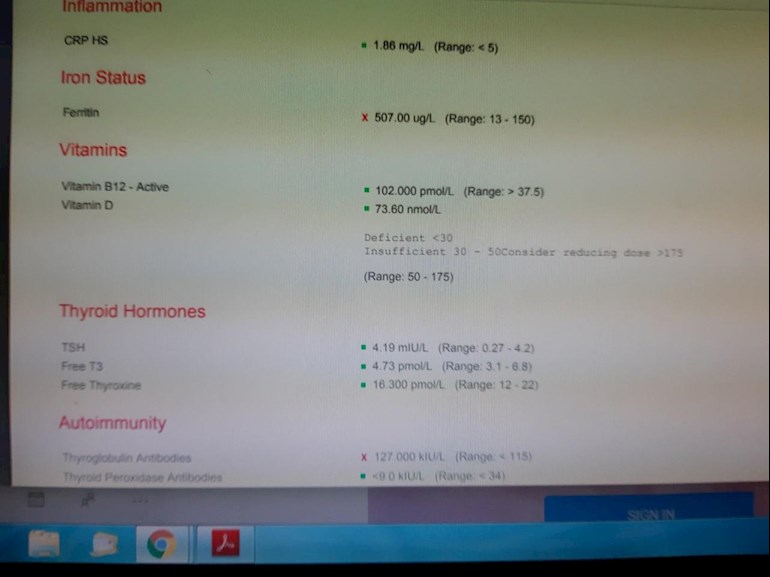Just received test results which are showing Ferritin as very high and also quite high for Antibodies. Having seen various gp's at my surgery I have at last been prescribed Levothyroxine 25 mcg as a starter (I'm 68) so have been taking it now for a couple of weeks. The reason behind her prescribing it is because I have heavy, tired legs and an enlarged tongue (could not be tested for Covid because of this) but I am wondering why my Ferritin is so high, maybe I should stop taking vitamin C? I have had some really helpful comments on site previously, more help would be gratefully received. I feel that I am getting somewhere albeit slowly.....
Blood test results help please: Just received... - Thyroid UK
Blood test results help please

Looking at previous posts you have been taking multivitamins....assume these included iron?
As you ONLY have high TG antibodies NHS won’t diagnose Hashimoto’s
But it’s likely high TG antibodies is due to autoimmune thyroid disease
Bloods should be retested 6-8 weeks after each dose increase
Dose levothyroxine should be stepped up slowly in 25mcg steps ...this continues for majority of people until on full replacement dose
NICE guidelines on full replacement dose
nice.org.uk/guidance/ng145/...
1.3.6
Consider starting levothyroxine at a dosage of 1.6 micrograms per kilogram of body weight per day (rounded to the nearest 25 micrograms) for adults under 65 with primary hypothyroidism and no history of cardiovascular disease.
gp-update.co.uk/Latest-Upda...
Traditionally we have tended to start patients on a low dose of levothyroxine and titrate it up over a period of months.
RCT evidence suggests that for the majority of patients this is not necessary and may waste resources.
For patients aged >60y or with ischaemic heart disease, start levothyroxine at 25–50μg daily and titrate up every 3 to 6 weeks as tolerated.
For ALL other patients start at full replacement dose. For most this will equate to 1.6 μg/kg/day (approximately 100μg for a 60kg woman and 125μg for a 75kg man).
If you are starting treatment for subclinical hypothyroidism, this article advises starting at a dose close to the full treatment dose on the basis that it is difficult to assess symptom response unless a therapeutic dose has been trialled.
A small Dutch double-blind cross-over study (ArchIntMed 2010;170:1996) demonstrated that night time rather than morning dosing improved TSH suppression and free T4 measurements, but made no difference to subjective wellbeing. It is reasonable to take levothyroxine at night rather than in the morning, especially for individuals who do not eat late at night.
BMJ also clear on dose required
bestpractice.bmj.com/topics...
Thank you for your reply, very helpful, I don't take iron supplements as they make me feel ill. I wonder whether I have haemochromatosis, will get further tests done as looking back over previous tests ferritin seems to be getting higher and higher
Well high ferritin can be made worse if supplementing vitamin C (as you already mentioned)
High ferritin doesn’t necessarily mean high iron too
So you need full iron panel test
High ferritin can be due to number of different reasons eg inflammation of Hashimoto’s, or non alcoholic fatty liver disease
I have Hashi's and haemochromatosis. Taking vitamin C will be aiding your absorption of iron. I would stop it.
Drinking tea with meals helps less iron being absorbed.
I also take IP6 by Jarrow which is a natural iron chelator.
Like Slow Dragon says, you need a full iron panel done. Transferrin saturation percentage indicates how much iron your body is storing. Ferritin can indeed be an indication of inflammation in the body and/or fatty liver. Until you can get the full iron panel done, you won't really know what you are up against.
Good luck.
x